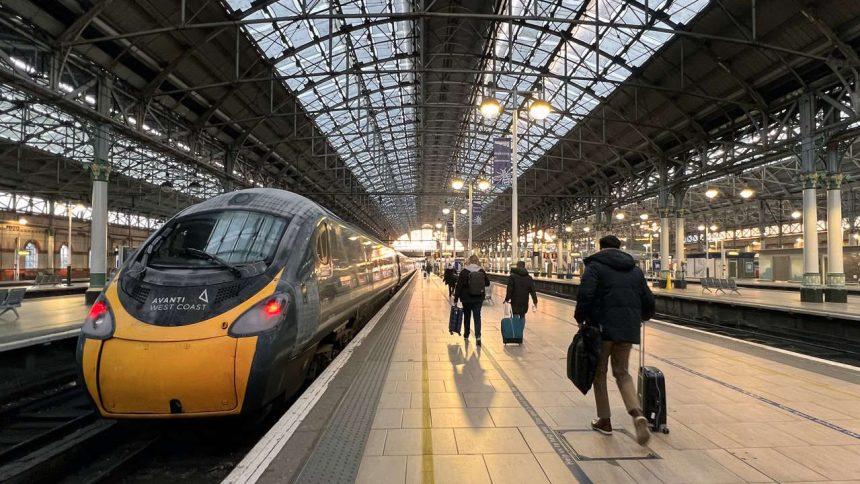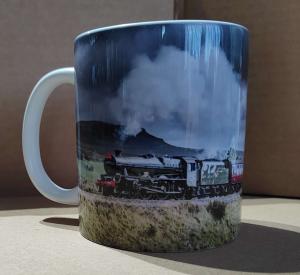The creation of Great British Railways (GBR) moved a step closer yesterday as a new draft bill was published.
The bill outlines the responsibilities of GBR, which will encompass a ‘whole-system view' taking in both rail infrastructure and services.
Clearer lines of responsibility are promised, along with a more modern and financially robust industry and a network which will prove more adaptable and efficient.
The management of the network and the commissioning of passenger services will be the responsibility of a single body.
This single point of accountability for railway performance was previously split between Network Rail and the Secretary of State for Transport.
The new body will have a regional structure to ensure that differing customer needs in various parts of the country become part of future decision-making.
The new bill will undergo pre-legislative scrutiny, allowing both politicians and industry experts to review the content, make appropriate comments and suggest amendments.
The proposed reforms are complex and will need to be as robust as possible. The scrutiny process will be led by members of the House of Commons' Transport Select Committee.

The bar has been set high, with government ministers claiming that the bill presents a bold vision for the future for rail customers – both passengers and freight.
It promises punctual and reliable services, simpler ticketing along with a modern and innovative railway. The ‘biggest rail reform in a generation' was first promised in the 2019 Conservative manifesto.
Since the railways were privatised in 1997 and British Rail ceased to exist, passengers numbers have doubled and much rolling stock has been replaced. But the bill recognises that more needs to be done to meet the needs of a modern economy and society.
Railways need to be more responsive to customers' needs as well as more efficient. They need to be open to technological improvement and innovation and they must be open to the private sector with the benefits it brings.
The powers of the Secretary of State for Transport to award new franchises will be transferred to GBR. Open-access operators will be encouraged, providing more direct links and travel opportunities for passengers and the experience for disabled passengers will be improved. GBR will also be expected to drive forward the rail freight sector. The Government has already set a target of 75% growth by 2050.
GBR will, in future, build on improvements already under way. These include extending pay-as-you-go ticketing to more stations in the South East with pilots to introduce tap-in, tap-out technology to 90 stations in the West Midlands and Greater Manchester due next year.
Similar technology is expected to be installed at more stations across the Midlands and the North of England as part of the £100m Network North plan. A further £350m will be spent to improve accessibility at up to 100 stations.
Reallocated funding from HS2 will support the Ely Area Capacity Enhancement scheme to allow an additional six freight trains to and from the Port of Felixstowe, the equivalent of removing 98,000 lorry journeys from the roads each year.

The Government has also published its response to the public consultation on its Plan for Rail, setting out the public's views on proposed reforms have influenced what now appears in the draft legislation.
While the bill applies mainly to Great Britain, ministers in Scotland and Wales will continue to use their devolved responsibilities, though there will be an option for them to delegate contracting authority to GBR if they wish.
Transport Secretary Mark Harper said: “It's been nearly 200 years since the birth of the British railways, and with travel patterns having significantly changed over the last few years it is now more important than ever that they keep up with the changing times.
“This draft Bill demonstrates our commitment to reforming the railways – working with industry, we will move towards a more modern and financially secure rail network that delivers for passengers for the next 200 years too.”
Andrew Haines, Great British Railways Transition Team Lead and Chief Executive Officer of Network Rail, added: “Passengers, freight customers and communities are crying out for a simpler, better railway and the publication of the draft Bill is an important step on that journey.
“Bringing track and train together under a guiding mind is by far the best way to improve the service the railway offers, unlock the economic potential of a growing network and reduce the burden on the taxpayer.”
Jacqueline Starr, CEO of the Rail Delivery Group, said: “It is good news that the Draft Rail Reform Bill has been published, this is another important step in setting up Great British Railways and moving forward with the agreed reforms to improve the railway for the customer.
“The challenges facing the rail industry are well known, but rail is a vital service and should have a bright future if we work together. I look forward to working with the Government to further develop the reforms needed to deliver for customers.”
Mark Plowright, Director at Virgin Trains Ticketing, comments: “No matter which side of the tracks you fall, it's clear both the Conservatives and Labour want to expedite reform by showing their commitment to improving the railways by putting passengers first. Whilst this is a welcome green signal, I remain disappointed that neither minister in this year's Bradshaw Address specifically spoke about rail retail, beyond fare reform. Buying a train ticket is the first interaction any passenger has with the network and getting the rail ‘shop window' right is crucial if we are going to boost rail ridership in the UK.
“That means fare reform – simpler and cheaper fares – but it also means addressing the regulatory divide between train operators and rail retailers, which is outdated, confuses passengers and stifles competition and consumer choice. Independent rail retailers play a vital role in helping drive modal shift and attract new passengers to the railways. From a passenger point of view, making proposition and fulfilment methods available across all retail platforms is the only way to make buying a train ticket easy and accessible for all. I'd like to see rail retail move up the agenda before the election and not something that's left in the sidings.”
Darren Caplan, Chief Executive of the Railway Industry Association, said: “The Railway Industry Association welcomes the news that pre-legislative scrutiny of the Draft Rail Reform Bill is now being taken forward.
“Last May, RIA and 70 of our members wrote to Prime Minister Rishi Sunak about the need to take the establishment of Great British Railways forward. So whilst we would have wanted a full Transport Bill providing for GBR progressing already, it is good that the Government is at least taking this preliminary step towards unifying track and train, and developing a “guiding mind” and a long-term plan for the railway.
“At a time when rail demand in the UK is showing a steady and continuing upturn, and with the RIA-commissioned Steer Report published just this week reporting that passenger numbers will grow between 37% and 97% to 2050, the Government needs to accelerate the legislative process without delay. The faster the Government pushes on with rail reform the faster we can remove uncertainty about the future structure of the industry and get on with building a vibrant and world-class railway for the future, delivering economic growth and enhanced connectivity across the UK in the decades ahead.”
Responding to the Government's publication of the draft Rail Reform Bill today, Transport Committee Chair Iain Stewart MP said: “We welcome the Government's publication of draft legislation on Rail Reform. Proposals to set up Great British Rail as a guiding mind for the rail sector have been broadly supported, and legislation to get these important reforms on track has been long awaited. The Transport Committee will soon launch an inquiry to scrutinise the draft Bill in detail and without delay. We will welcome views from across the sector, and will look to complete our work in good time before Parliament's summer recess.”
Responding to the publication of the draft Rail Reform Bill, Rail Partners chief executive Andy Bagnall said:
‘The publication of the draft bill is a useful step forward, which clearly recognises that train companies add significant value to passengers and freight customers, alongside a guiding mind.
‘Rail reform doesn't have to be a binary choice between a monopoly railway in public hands and franchising. We must embrace the ‘best of both worlds,' focusing the system outwards on customers by empowering operators to meet their needs, but also creating a single accountable body so the public knows who is in charge.
‘While not a substitute for legislation, the draft bill kicks off an important process to identify areas of consensus and disagreement between the political parties ahead of a general election. In the meantime we must get on and deliver for customers, so non-legislative measures that support the freight growth target and improve the customer experience, such as more pay as you go, are very welcome.'


















Despite all the crowing about increased passenger numbers the railways are a mess. Each train operator has its own management team and they don’t talk to other operators. There are hardly any facilities for rescuing a broken down train presumably as they can’t make up their minds who is going to supply the locomotive. On my local GWR station the map doesn’t show the SWR line to Waterloo even though it starts in the same city. The walk on fares for any journey of over 50 miles are ridiculous. These proposals seem to offer nothing to solve these problems, only adding extra layers of management which will increase the bloated mess even more. And what about journeys which run from England into Wales or Scotland? They aren’t going to take part in GBR.
Wonder how more managers will be recruited by Network Rail and indeed the industry as a whole and how much more money will be extracted from the industry in the name of dividends and share holder value ..
One overal body, looking after the needs of customers, freight and train operators – sounds like the BRB
Is it absolutely necessary to have a “get on with building a vibrant and world-class railway for the future,”
Does the world-class railway have to have a world-class cost or would a small European Island Railway costs be sufficient?
Andrew’s comments reflect the perception amongst the public in that there is no “joined up thinking” in the running of the railway.He is right.However, Network Rail is alive to whether or not our railways have sufficient resilience, considering the increased weather events and the age of some railway infrastructure (Victorian). To be fair some such events are not predictable.There are back up plans.The lack of joined up thinking is really at the higher and more strategic levels of railway planning .
How about making sure you have proper backup plans for when things go wrong, which they inevitably do? Wires down, failed trains, emergency engineering work, major event crowds, bad weather. The current railway always seems to be taken by surprise by such predictable happenings.
The truth is the Government’s rail policies are in tatters.HS2 has been ditched, rather than postponed.The early chance to create one online site for rail ticketing has been dumped.A hairbrain scheme , “Great British Railway Transition team has hit LNER.I mean the “70 minute Flex ticket” , which deprives us of off peak tickets on LNER London to Edinburgh.The Bill might not receive Parliament time.